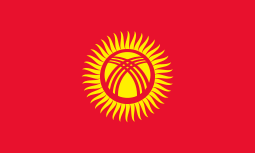Corruption in Kyrgyzstan
| Political corruption |
|---|
 |
| Concepts |
| Corruption by country |
| Europe |
| Asia |
| Africa |
| North America |
| South America |
| Oceania and the Pacific |
| Transcontinental countries |
Kyrgyzstan is ranked as the 154th in the Corruption Perceptions Index in 2012,[1] and despite having a strong legal framework, there still exists a huge gulf in implementation of the law.[2] Kyrgyzstan’s rampant corruption which penetrates all levels of society, including the presidency, eventually caused the Tulip revolution in 2005, overthrowing Askar Akayev, and the 2010 Kyrgyzstani revolution, ousting Kurmanbek Bakiyev from office.
History and Cases
Akayev Administration
In 2005, after the revolution that overthrew President Akayev, a commission was set up to investigate his business assets; the tentative list was for 42 businesses inclusive of the Kumtor Gold Mine.[3] As early as 2002, Akayev and his son Aydar were alleged to have received $2 million in lease payments, along with other payments, totalling $119 million through his two airport service companies.[4] However, investigations have met with much difficulty in identifying the exact ownership of the companies.
Bakiyev Administration
President Bakiyev, after his rise to the presidency in 2006, in turn appointed his son, Maxim Bakiyev, to the nation’s development agency. There were murky deals signed with the China and the transfer of assets to overseas tax havens.[5] It is alleged that Bakiyev’s son channelled $35 million of the $300 million into his own private bank account.[6]
Judicial System
The judicial system is viewed with strong distrust by the population. The courts under President Akaev were used to suppress the opposition, and under President Bakiyev, the courts continued the same purpose, deregistering credible opposition parties for the 2007 elections.[7] There was widespread protest about the supreme court decision to close the case involving the police killing 6 people in Aksy district in March 2001, when President Bakiyev was then Prime Minister.[8] The frustration with the endemic corruption in the judicial system has even provoked some set up an individual system of law enforcement.[9] In 2000, a survey was conducted with 2100 respondents holding the view that the judicial institution was the 2nd most corrupt organization, and 83% of respondents holding the view that corruption was rife there.
2011 Amendment of Hajj Law
The Kyrgyzstan parliament made changes to its laws to prevent the officials profiting from the corrupt distribution of hajj pilgrimage places allocated to the country by Saudi Arabia. Officials have been accused of selling or distributing them to their relatives and friends instead of fairly allocating the quota.[10]
Anti-Corruption Efforts
Anti-Corruption legislation includes the Criminal Code of Kyrgyzstan which criminalises the major forms of corrupt activity, including passive bribery, attempted corruption, extortion, money laundering and abuse of office.[11]
A number of organizations like the Anti-Corruption Business Council and the NGO, Citizens Against Corruption, have been set up to tackle the endemic corruption besetting the country. The government launched a new anticorruption website in March 2011 with the promise that the government, Prosecutor-General office and the police will check every case.[12] though many have remain sceptical on the usefulness of the website[13]
References
- ↑ "Corruption Perceptions Index 2012". Retrieved 7 December 2012.
- ↑ "Global Integrity Report". Retrieved 19 September 2011.
- ↑ Kimmage, Daniel (May 4, 2005). "Kyrgyzstan: Follow The Money -- The Akaev Investigation". Retrieved 19 September 2011.
- ↑ Daly, John (31 December 1969). "Kyrgyzstan: Business, Corruption and the Manas Airbase". oilprice.org. Retrieved 19 September 2011.
- ↑ Cohen, Ariel (April 9, 2010). "Kyrgyzstan's Corruption Instigated Revolution". Forbes. Retrieved 19 September 2011.
- ↑ Bishkek (April 16, 2010). "Bakiyev's son suspected of Russian loan embezzlement". RIA Novosti. Retrieved 19 September 2011.
- ↑ "KYRGYZSTAN: THE CHALLENGE OF JUDICIAL REFORM" (PDF). Asia Report N°150. International Crisis Group. April 10, 2008. Retrieved 19 September 2011.
- ↑ Pannier, Bruce (June 28, 2007). "Kyrgyzstan: New Aksy Probe Could Reach Current Circles". RFE/RL. Retrieved 19 September 2011.
- ↑ "Southern Kyrgyz Village To Judge Criminals". RFE/RL. September 9, 2011. Retrieved 19 September 2011.
- ↑ "Kyrgyzstan Amends Laws To Prevent Hajj Corruption". RFE/RL. February 5, 2011. Retrieved 19 September 2011.
- ↑ "Kyrgyzstan Corruption Profile". Business Anti-Corruption Profile. Retrieved 14 July 2015.
- ↑ Valdez, Adrienne (March 23, 2011). "Kyrgyzstan launches anticorruption website". FutureGov. Retrieved 19 September 2011.
- ↑ "Kyrgyz sceptical of new government anti-graft website". Trustlaw. Retrieved 19 September 2011.

